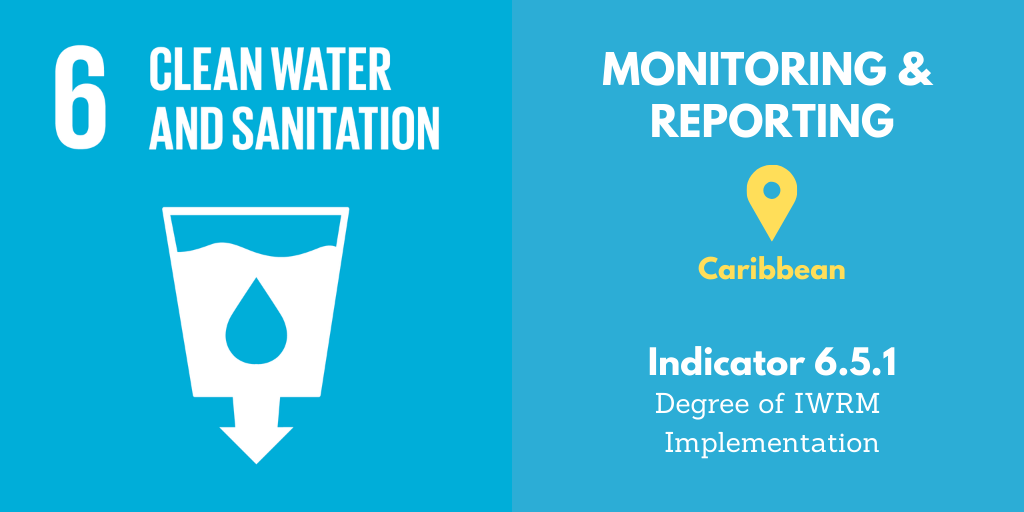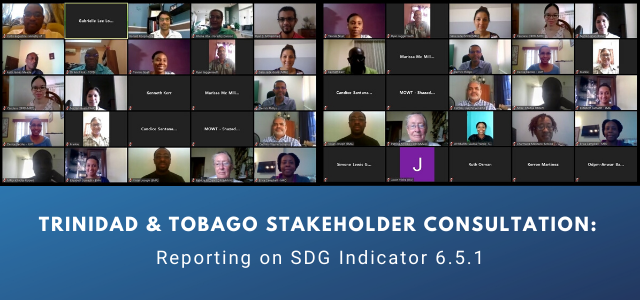Sustainable Development Goal (SDG) 6 aims to “Ensure availability and sustainable management of water and sanitation for all” by 2030. When countries adopted this along with the other SDGs, they committed to report data on SDG indicators to the United Nations (UN) to track progress and ensure accountability. For SDG 6, a 2020 Data Drive has been launched to close the data gap. It involves countries collecting and reporting data on various SDG 6 indicators to multiple UN agencies, coordinated by UN-Water.
The United Nations Environment Programme (UNEP) is the custodian agency for SDG indicator 6.5.1 – which tracks the degree of Integrated Water Resources Management (IWRM) implementation. Under the Data Drive and with the help of the SDG 6 IWRM Support Programme the second round of reporting on this indicator is underway in 2020. The first data collection cycle on it was done in 2017. The Support Programme assists governments in designing and implementing country-led responses to the Indicator. It is guided by UNEP and coordinated by Global Water Partnership (GWP) in close collaboration with UNEP-DHI Centre and Cap-Net UNDP.
As the Caribbean arm of GWP, the Global Water Partnership-Caribbean (GWP-C) has been supporting the 2020 Data Drive, by reaching out to Caribbean countries (through their SDG 6.5.1 Focal Points) to do the second round of data collection.
The first country in this global process to begin its reporting on SDG 6.5.1 in 2020 is Trinidad and Tobago. The Caribbean island was proactive in arranging a virtual two-day Stakeholder Consultation (which would have otherwise been in-person) to facilitate reporting on the indicator. Presently, it is the only country that has conducted this activity online. The National Stakeholder Consultation took place on April 29th and 30th, 2020 for a little over three (3) hours on each day. It was coordinated by the Ministry of Public Utilities (MPU) of Trinidad and Tobago (SDG 6.5.1 Focal Point) with the support of GWP-C.
The online Consultation was facilitated by Dr. Ronald Roopnarine, Network Manager of Caribbean WaterNet (Cap-Net UNDP). More than thirty (30) stakeholders participated on both meeting days from various government ministries and associated divisions, statutory bodies, civil society organisations, non-governmental organisations, community-based organisations, private sector firms, research/ educational institutions and more.
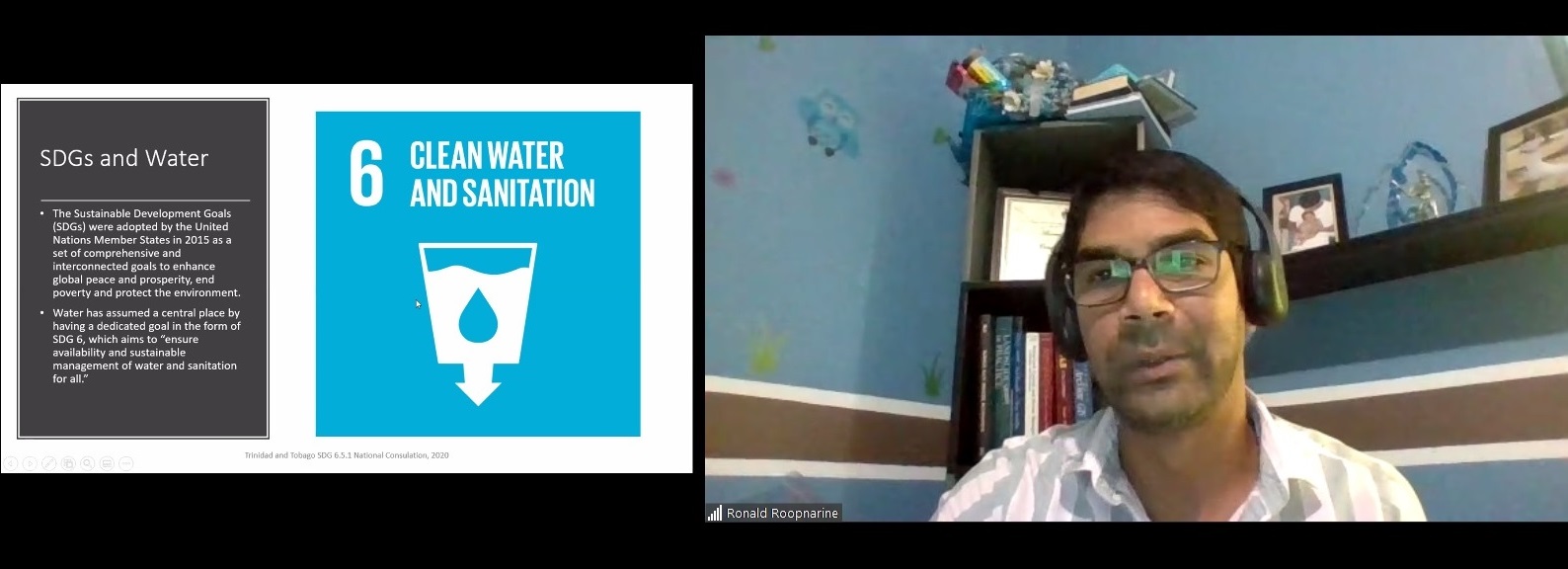
Dr. Ronald Roopnarine - Facilitator of the Virtual Trinidad and Tobago Stakeholder Consultation on SDG Indicator 6.5.1
The Meeting kicked-off with all participants having the opportunity to introduce themselves, share a bit about their organisation and the work they are involved in. The Facilitator, Dr. Roopnarine then established the context and purpose of the Consultation and gave a comprehensive background and overview of SDG indicator 6.5.1.

He explained that a detailed survey of about 30 questions covering various aspects of IWRM, would be the instrument used over the two (2) days. Apart from the survey contributing to global monitoring and reporting, he explained that it acts as a simple diagnostic tool for countries to identify strengths and weaknesses of IWRM implementation. It does this by assessing the following four (4) components:
- Enabling Environment: Policies, laws and plans to support IWRM implementation.
- Institutions and Participation: The range and roles of political, social, economic and administrative institutions and other stakeholder groups that help to support implementation.
- Management Instruments: The tools and activities that enable decision-makers and users to make rational and informed choices between alternative actions.
- Financing: Budgeting and financing made available and used for water resources development and management (apart from drinking water supply and sanitation) from various sources.
Dr. Roopnarine emphasised the importance of stakeholders putting forward their contributions throughout the Meeting and the goal of the group reaching a consensus on the scores for each of the four (4) sections. According to him “SDG 6.5.1. can be seen as the backbone to support the implementation of the other SDGs; water is cross-cutting and has influence over all sectors and therefore has a critical role to play.”
Each question in the survey instrument, allowed stakeholders to provide a status description on it and recommend a way forward. This prompted fruitful and constructive discussions. Though conducted fully online via Zoom, the Consultation was carefully planned to encourage continuous interaction and sharing amongst participants.
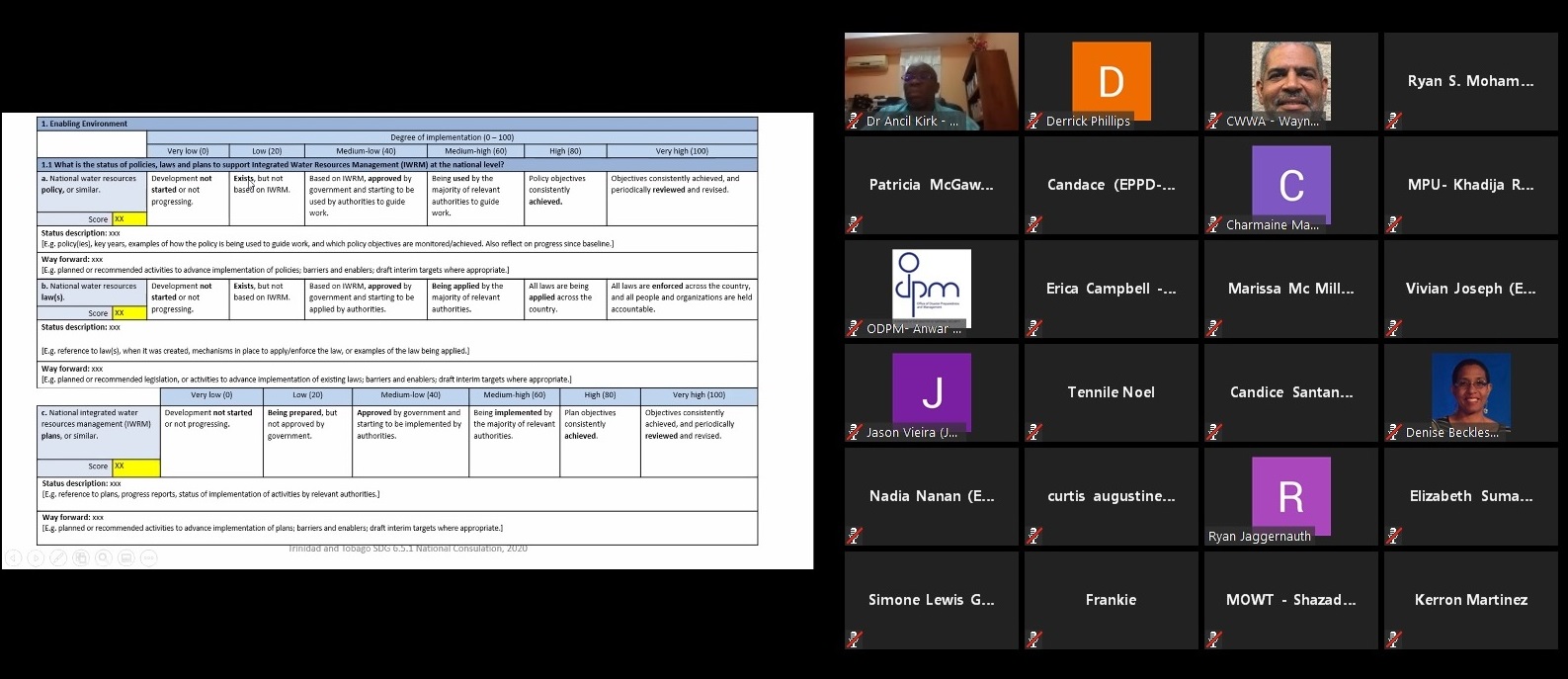
One method of engagement used in the Consultation was interactive polls. From the very start of the Session, the Facilitator encouraged stakeholder interaction with a poll on “General Knowledge on Sustainable Development.” This was later followed by one on Trinidad and Tobago’s (T&T’s) SDG 6.5.1 baseline assessment in 2017. Other polls were used strategically throughout the Meeting.
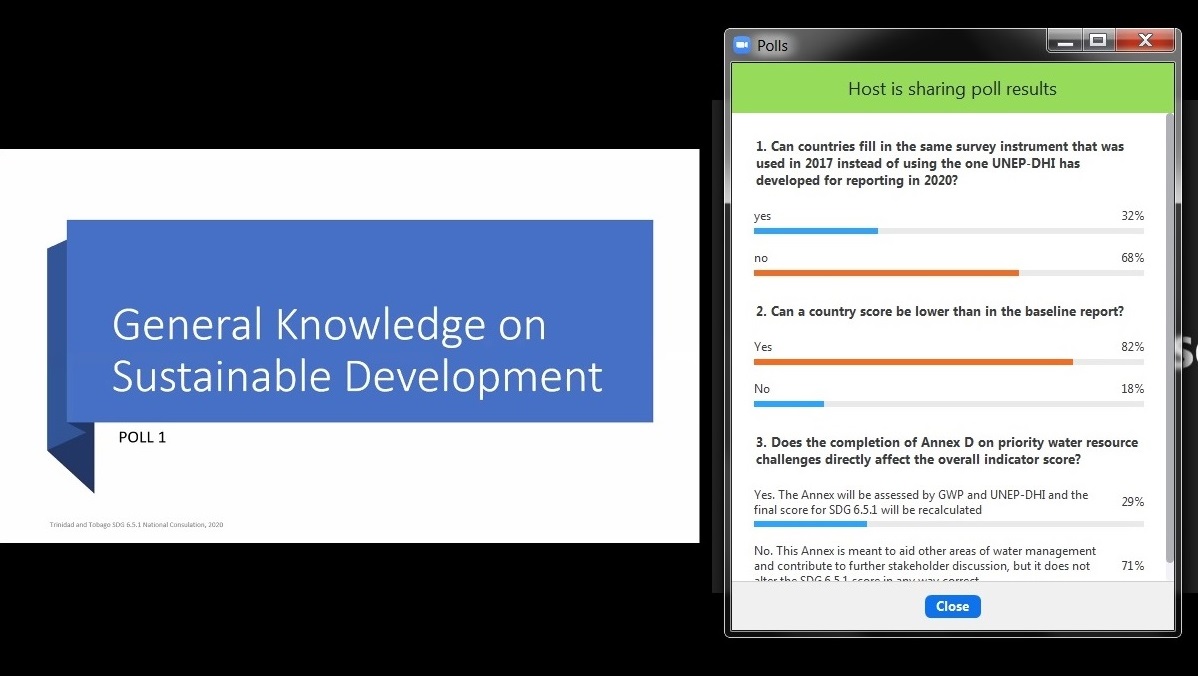
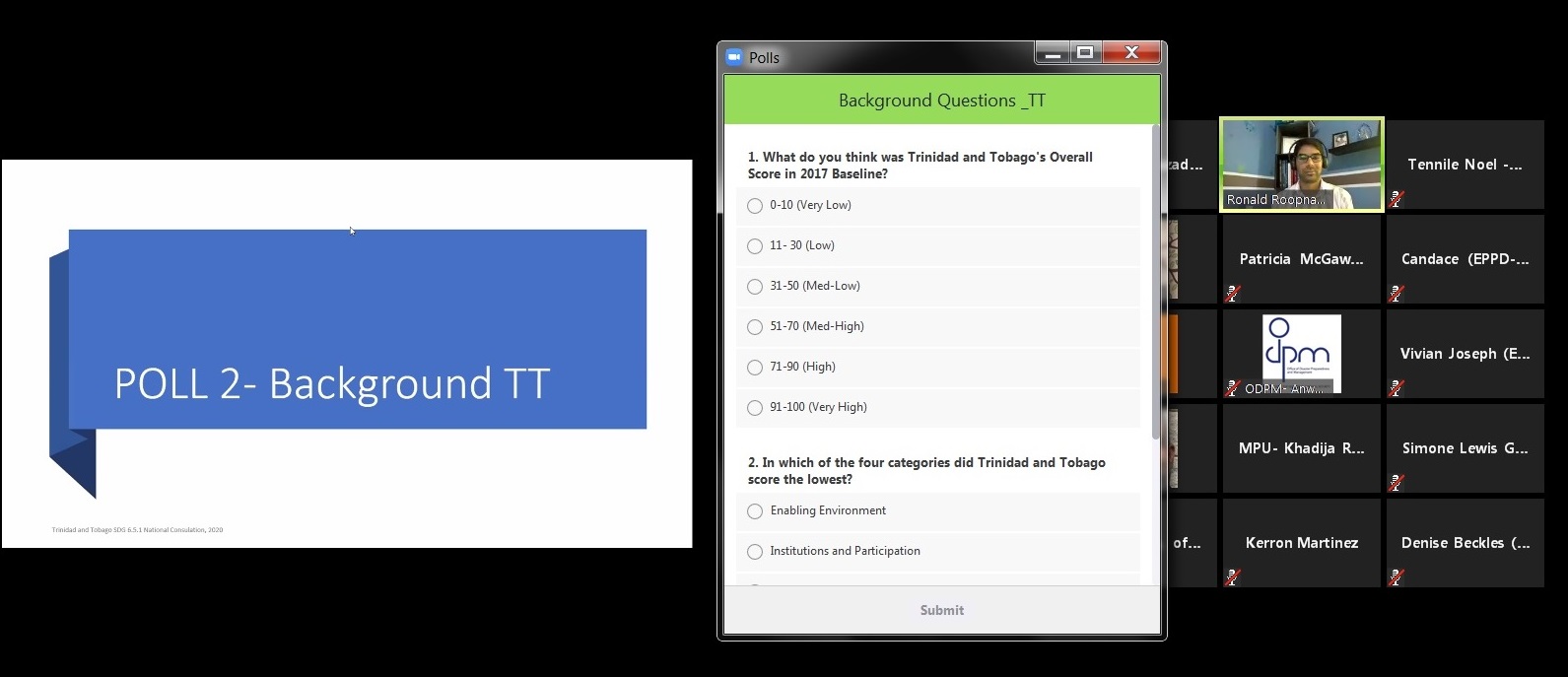
There were plenary sessions providing an overview of each of the four (4) major IWRM assessment areas. After each briefing, the Facilitator would put stakeholders into breakout rooms to discuss and score questions under the particular section. Following these allotted breakout sessions, when participants returned to the main room, it provided an opportunity for each group to share their scores. This enabled comparison, discussions, sharing of knowledge and experiences amongst all working groups, to reach a consensus on the appropriate score for each question.
In discussions, participants acknowledged the benefits of regional and global reporting on SDG 6.5.1. In reference to the baseline data collected in 2017, some participants recommended looking at best practices and solutions used by countries (both in the Caribbean and internationally) that would have attained a higher score than T&T in 2017. For example, looking at comparative nations, where T&T would have some similarities to Oceania and Pacific countries.
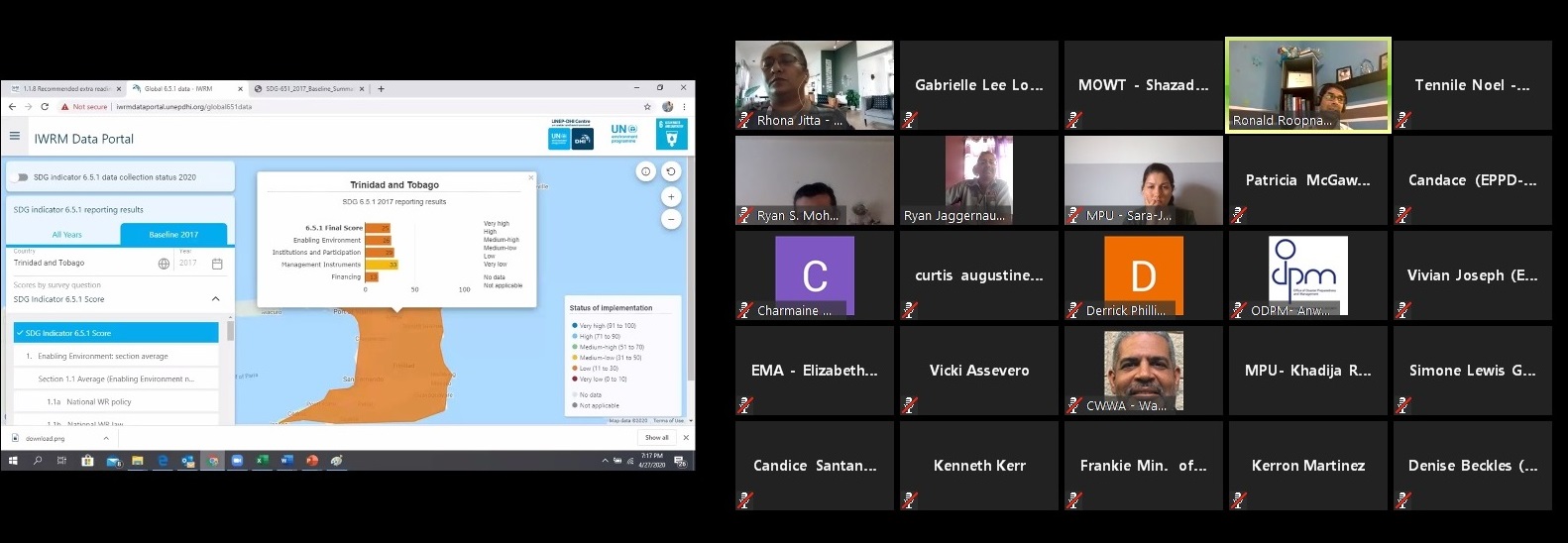
Some participants commented that based on the 2017 assessment, various countries that ranked high in terms of their degree of IWRM implementation, seemed to have an integrated reporting system between various agencies. Noting that in the T&T context, there are opportunities to centralise information. The need for central statistical agencies that act as a central repository of data was an issue that was raised. From discussions, there were instances where stakeholders in one agency may have done something similar to another or projects, that neither were aware of it.
Some participants shared that they believed that one of the hindrances in achieving SDG 6 in 2030, is the need for the implementation of current laws, the amending of some old ones and more monitoring and reporting; a less fragmented approach.
The entire exercise allowed for a step-by-step process of stakeholders examining T&T’s IWRM implementation progress. The sharing of experiences, perspectives and recommendations enabled rich knowledge exchange. Stakeholders present stressed that IWRM requires ongoing collaboration.
The Stakeholder Consultation achieved its objective by completing the SDG 6.5.1 survey and reaching a consensus on scores. Participants also expressed that they were pleased with how the assessment was facilitated, despite being entirely online. T&T’s country response (completed SDG 6.5.1 Survey) and a Stakeholder Consultation Report will be submitted to UNEP. GWP-C will be working with other Caribbean countries, who will endeavour to carry out this activity before July 2020.
